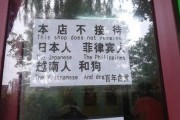
One of the most read and most commented on articles on Japanese internet boards this weekend was written by the well-known 88-year-old Japanese TV cook Suzuki Tokiko. Originally intended to be published in the popular housewife magazine Josei Seven, the article quickly went viral after it was published in the online edition of the magazine.
The article describes Suzuki’s vacation in the UK, where she encountered a sign warning Japanese tourists not to enter a private garden in the Cotswolds. Since the sign was written in Japanese, Suzuki felt embarrassed, interpreting this as an indication of the bad behaviour of Japanese tourists abroad.
Netizens commented in the thousands on the behaviour of Japanese abroad, and while some decided that the Japanese need to improve their manners, others noted that Japanese signs in the Cotswolds were common. Surprisingly, no one mentioned how unusual it was that an 88-year old woman’s innocuous travel notes could cause such a stir on the Japanese internet.
From Josei Seven:
‘I Was Shocked at the Behaviour of my Fellow Countrymen’: Warning Sign Written in Japanese Seen in UK
Suzuki Tokiko (88), is the popular cooking expert nicknamed ‘Baaba’ from television programmes such as NHK’S ‘Today’s Cookery’ and ‘Asaichi’. Here, she tells us about British cookery, after having been on a tour of Scotland and the Lake District, the Cotswolds, and then London, for more than ten days.
A long time ago, it used to be said that ‘British food is unappetizing,’ but that is not the case. On my recent travels, I made many ‘delicious memories’ (笑). And of these memories, the one that touched me most was of mushrooms. I’m not talking about the small, cute mushrooms that you see in Japan, but jumbo mushrooms, that must have a diameter of 6 or 7cm. When sautéed whole, and served for breakfast and so on, there really is nothing more delicious! So much so that I had extra helpings without a second thought.
If I were to cook it…Certainly, I would grill a whole jumbo mushroom, coat it with a little soy sauce, squeeze a little sudachi over it, and eat it. It would be exceptional.
So I stayed in England as though in a dream, but during my stay in the Cotswolds, I came across a spectacle that shattered my dream into pieces.
Please do not enter the garden without permission.
The large sign, written in perfect Japanese, was standing outside the gates of a house. There was nothing else written there. Only the Japanese.
The moment I saw this sign, I was at a loss for words from my intense shame. It troubled me deeply that the sign was only written in Japanese.
‘Could it be?’ I thought, when I looked. Wasn’t that a group of people who looked Japanese, peering inside over the fence, right next to the sign? I almost collapsed from shock when I saw the conduct of my fellow countrymen.
They say that someone away from home should feel no shame, but it is unthinkable. Whether in Japan or abroad, shame is shame. No matter where we go, let us not forget our pride and humility as Japanese people. That is an earnest request from me.

Japanese tourists in a popular Cotswold rapeseed field
Comments from 2ch:
ベンガル(家):
Come on, show us a picture of the sign at least!
ソマリ(大阪府):
Isn’t it on Google Street View?
スペインオオヤマネコ(庭):
Aimu zapaneezu [‘I’m Japanese’ written in katakana]
白黒(西日本):
A lot of you guys are getting caught up on the term ‘fellow countrymen’ but Governor Ishihara [Governor of Tokyo] uses it quite a bit.
イリオモテヤマネコ(東日本):
Seems to me that if there had been no sign written in Japanese this old woman would’ve gone in too.
ヒョウ(関東・甲信越):
There is nothing so shameless as groups of elderly people.
オリエンタル(東京都):
If you do an image search of the Cotswolds, you can see how they’d all stagger into the gardens.
ボルネオウンピョウ(やわらか銀行):
557 名前:名無しさん@13周年[sage] said this:
‘This is another awful example of manipulation of information.
Since there have always been large numbers of Japanese tourists in the Cotswolds, in various places, like on the railways and on the buses, there are signs to guide tourists written in Japanese. That is to say, this warning sign is also one of those used for guidance. They’re not there because Japanese tourists have particularly bad manners.I mean, the way someone would take ‘There is one warning sign out of lots of Japanese signs’ is pretty different from how you’d take ‘there is a warning sign written in Japanese’, right?
Look out, here comes your favourite source:
http://kngod.blog67.fc2.com/blog-entry-271.html
スフィンクス(東京都):
Over 3,000,000 tourists visit the Cotswolds every year: http://www.news-digest.co.uk/london-olympics/travel/uk-travel/42-cotswolds-part1.html. Even if that’s a lot, Japanese tourists only make up less than 2% of this number with around 50,000 going each year. Surely the fact that they go to the trouble of writing ‘Do not enter’ signs in Japanese suggests that the manners of the Japanese tourists are bad.
ノルウェージャンフォレストキャット (愛媛県):
That’s because the cultural standard is such that they write crappy proverbs like ‘a man away from home should feel no shame’.
スフィンクス(東京都):
It’d be good if their manner awareness increased enough for ‘A man away from home should feel no shame’ to become an obsolete phrase.
Comments from Yutori:
ゆとりある名無し :
Out of the 3,000,000 tourists that someone mentioned, how many do you think can’t read English?
ゆとりある名無し :
Even in Japan, if somewhere is even slightly touristy then there will certainly be signs in English and Chinese, and you even see signs in Italian, French, Korean, Arabic. I’ve never seen a place Italians go to though. Anyway, this article might have been written as reprisal for a sign that said ‘No people from a certain country’, but I think if you’re Japanese you’d just think ‘I’ll be careful if I go there’. Or perhaps the article even wants to say ‘This is proof that Japanese are hated.’
ゆとりある名無し :
It’s because Westerners can’t tell the difference between Chinese and Koreans, and Japanese. Can you guys tell the difference between someone German and someone Dutch?
ゆとりある名無し :
In Japan it’s normal to walk on a lawn, but over there they treat them like flower beds. It wouldn’t unusual if a Japanese person stepped on a lawn. There are some experts who are so proud of their lawns they get mad if you step on them.
ななし :
Even if old women aren’t on holiday there are still a lot of them who have bad manners. There are also probably people from other countries who stepped on the lawn and said they were Japanese though.
ゆとりある名無し :
Seems like there used to be warning signs in hotels overseas written in Japanese that said ‘Please don’t take the towels home with you’, so I think that they couldn’t help but laugh at the Japanese and Chinese. I wonder what it’s like now?
ゆとりある名無し :
Because an 88 year old woman was ashamed and told us to have standards, shouldn’t we just take it on board and be careful of doing things that cause bother to others, and have standards ourselves? We shouldn’t be bringing other countries into it, ridiculing them, looking down on others or trying to justify the numbers of Japanese tourists. I think it is just this kind of inferior behaviour that we need to be careful of.
ゆとりある名無し :
If it’s embarrassing to see Japanese guidance signs overseas, then first of all let’s remove all the guidance signs written in hangul in Japan. It must be embarrassing for Koreans, who by their own admission are the politest people in the world, when warning signs are written in hangul: ‘Please flush the toilet paper down the toilet’, ‘This is not a tasting sample’ and so on w
What do you think? Was the Suzuki Tokiko and other Japanese netizens’ reactions reasonable?







